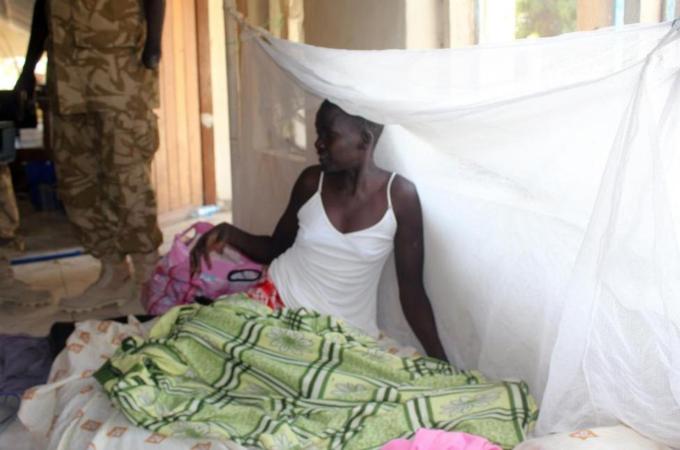Violence Against Women
Source: Aljazeera
Darfur no longer grabs the headlines as it falls out of favour as a cause celebre yet the atrocities, especially against women, haven't stopped.
Last week a report emerged that some 200 women, including 80 minors, were mass raped by a Sudanese Army garrison in the village of Tabit, northern Darfur. Reportedly, the soldiers started their raping spree on Friday evening and went on until 4am the following day.
The special prosecutor for crimes in Darfur denied the mass rape saying they inspected and "verified the inaccuracy of what has been circulating in social media, and some of the local radio stations". Initially denied and then granted access, the African Union-UN Hybrid Operation in Darfur (UNAMID) investigated and concluded its "team found no evidence confirming the claims and received no information regarding the purported acts".
The depressing fact is that it's not inconceivable for such a crime to have occured. The systematic degradation and violation of Sudanese women has been a trait of the regime's 25-year-rule. Articles 151, 152, 154 and 156 of the criminal code "enforce restrictions on women and the way they dress and behave in public". If they commit an act "deemed by an officer of the law to be in violation of these articles, they may face a lashing sentence [or] be forced to pay a fine".

Achrin Mapio claims she was raped by South Sudanese rebels [AFP]
Systematic rape
The power and authority handed to officers to arbitrarily decide what they deem acceptable attire and to enforce the punishment is clear in a number of graphic videos of females being brutally flogged . In Darfur and the Nuba Mountains, women are the target of "systematic rape and other forms of sexual violence, such as threat of rape, sexual exploitation, sexual harassment, sex trafficking, forced marriages, forced prostitution and sexual slavery".
Female Darfurian students continue to face detention and harassment from officials. In early October, 70 female students were forcibly evicted from their dorms, with 16 held without charge and reportedly subjected to abuses
An Amnesty International report from 2004 documented how rape was used as a weapon of war: The testimonies "all describe a pattern of systematic and unlawful attacks on civilians in North, West and South Darfur states, by a government-sponsored militia [the Janjawid] ... and by the government army".
"Violence against women is occurring in a context of systematic human rights violations against civilians in Darfur. Women have been summarily or indiscriminately killed, bombed, raped, tortured, abducted and forcibly displaced... girls have, like women, been the particular target of rapes, abductions and sexual slavery."
A decade later, the picture is the same for the people of Darfur. Female Darfurian students continue to face detention and harassment from officials. In early October, 70 female students were forcibly evicted from their dorms, with 16 held without charge and reportedly subjected to abuses , including sexual, and accused of supporting rebel Darfur groups.
How much more sexual violence against Sudanese women will the world tolerate? The UK Foreign Secretary released a statement regarding the alleged attack in Tabit, which is nice but what about the training of - and support for - the Sudanese military, police and security personnel by his own government?
What good is such a statement if officials continue committing their alleged atrocities with the tacit support of others who play the blind, deaf and ignorant cards? The UN isn't innocent either - accusations of a "cover-up" and "failure to properly report crimes against civilians ... in Darfur" is another example of abetting the Sudanese government.
Global attention
Gross violations against civilians will continue to occur unless more is done. Will global attention and campaigning keep Darfur and the Nuba Mountains in the headlines thereby putting pressure on the government? Possibly. But reform of legislature is paramount.
The Bill of Rights promises equality to all, yet the "legal code entrenches gross gender oppression and an environment in which violence against women can be perpetrated with complete impunity, especially by state and military personnel".
Legally, rape is defined in Article 149 as "sexual intercourse by way of adultery or homosexuality with any person without consent". This means the law itself "conflates rape with adultery, with serious consequences for victims of sexual violence". Furthermore, "legal action cannot be taken against members of the military, security services, police, and border guards and immunity may only be lifted by the individual's superior officer".
There's also the cultural drawbacks to contend with as women who do report a rape can be accused of committing adultery (zinna), a crime in the eyes of Sudanese law especially as the burden of proof lies with the victim. The social and cultural stigma of reporting a rape can also break the strongest of wills as evidenced in the case of Safia Ishag. A member of the youth movement Girifna, she says she was gang-raped and beaten by three officers from the notorious National Intelligence & Security Services (NISS) and after posting a video documenting her rape, the harassment she faced forced her to seek refuge in France.
Back in 2007, Bashir laughingly said to NBC News: "It is not in the Sudanese culture or people of Darfur to rape. It doesn't exist. We don't have it."
This, from a head of state still wanted by the International Criminal Court for war crimes - crimes that include rape.
Debate on whether the alleged attack on the village of Tabit did or didn't take place will continue but one thing is certain - these violations will also continue as long as the regime is given carte blanche to do so.
